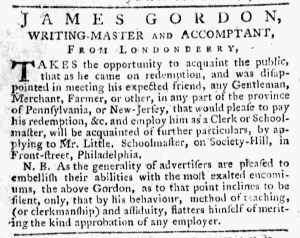What was advertised in a colonial American newspaper 250 years ago today?

“A lecture on the necessity, advantage, beauty, and propriety of a just vocal expression.”
When Mr. Rathell, “formerly of Annapolis, Teacher of the English Language, Writing-master and Accomptant,” opened a school and offered private lessons in Baltimore he introduced himself to prospective students and their families with an advertisement in the Maryland Journal. Much of the lengthy advertisement focused on establishing his experience and credentials. Rathell noted that he “for some time superintended the Academy of the late eminent Mr. Dove, professor of oratory in Philadelphia.” That led to Dove recommended him as a private tutor who earned “the approbation of many respectable families” in the largest city in the colonies. Rathell claimed that he “can produce indubitable proofs” of Dove’s approval of his endeavors as a private tutor. He also promised to strive to continue “to do justice to the recommendation of the celebrated teacher … whose memory is justly revered by the first literary character in America.” If prospective students and their families were not familiar with “the late eminent Mr. Dove,” Rathell implicitly suggested that reflected on them and gave all the more reason that those who wished to rank among the genteel needed to engage his services.
Furthermore, the tutor gained additional experience in Lancaster, Pennsylvania. “To give still greater weight to his credit as a private tutor,” Rathell exclaimed, “he cannot avoid mentioning, with very great respect, that at Lancaster he has been favoured with an attendance on several Ladies eminent for literary accomplishments.” He lauded his former pupils, recognizing “their own happy genius,” while also insisting that their accomplishments “would give consequence to, and establish the reputation of, the most capital teacher at the first court in Europe.” Despite the distance that separated Baltimore from London, Paris, and other centers of cultural and fashion, Rathell asserted that his students received instruction that rivaled that available to monarchs and nobles.
Rathell also used his advertisement to preview a program that he envisioned, one that had the potential to enhance his reputation in Baltimore and attract more students to his school. He proposed “to read, in public, a few pieces from the most eminent English authors.” The elocution of the “Teacher of the English Language” would be on full display for his audience. In addition, he planned “to deliver a lecture on the necessity, advantage, beauty, and propriety of a just vocal expression, wherein the use and elegance of accent, quantity, emphasis, and cadence will be illustrated.” Again, Rathell made an implicit argument to prospective students and their families. It did not matter how expansive their knowledge of literature or how fashionably they dressed if their manner of speaking betrayed them as not truly genteel. Learning to express themselves with “elegance” was an aspect of personal comportment vital to demonstrating status and sophistication. Those who did not master their speech risked being considered imposters when they gathered with the better sort. Like many other tutors, whether they taught elocution or dancing or French, Rathell played on the anxieties and insecurities of prospective students and their families while also trumpeting his experience successfully teaching others skills associated with gentility and social standing.

